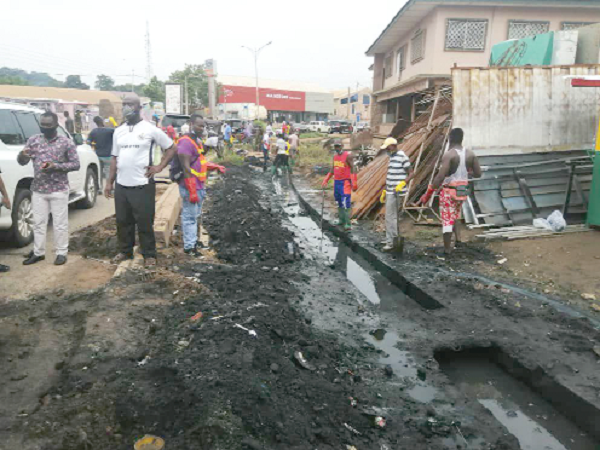The government has awarded 115 contracts for the construction of drains and culverts in various parts of the country.
The works are at different stages and are to complement the 19 kilometres (km) of new drains already completed nationwide.
The Head of Drains at the Ghana Hydrological Services Department, Mr Seth Kudzordzi, who disclosed this in an interview yesterday, said the completed drains could be found at Haatso, Agbogba, Madina, Apenkwa and Tse-Addo all in the Greater Accra Region, Kasoa in the Central Region, and Aboabo, Amakom and Tepa in the Ashanti Region.
He expressed optimism that the incidence and impact of avoidable flooding would not be as severe as recorded in previous years in the wake of interventions being undertaken nationwide as he responded to the Daily Graphic’s query about the country’s preparedness ahead of projections of heavy rains made by the Ghana Meteorological Agency.
Massive investments
Mr Kudzordzi mentioned the ongoing interventions to include clearing a and dredging of major water bodies such as the Odaw River, the Chemu Lagoon and other drains.
“The government has demonstrated commitment in dealing with avoidable floods in the country through the investments it had made since 2018. Fortunately, investments made into the 2018-2020 flood control programme is likely to yield results if the rain comes within the limits of what we experienced in previous years,” he said.
He, however, indicated that because many communities lacked proper drainage systems, the desired impact of the government’s interventions in those areas would be gradual.
Human effect
Mr Kudzordzi said although flood was sometimes a natural occurrence due to climate change and heavy rainfall, the severity of the phenomenon in the country had always been compounded by human actions such as dumping refuse into drains and building on watercourses.
He also mentioned inadequate drainage systems nationwide as a major cause of man-made floods over the years, adding that the government had put in place an infrastructure programme to gradually address the challenge.
He said his outfit was optimistic because places that experienced heavy flooding with the slightest rain, including Avenor, Madina and other suburbs of Accra, were not submerged after the recent rains.
Mr Kudzordzi said the Greater Accra Resilient and Integrated Development (GARID) project being implemented in collaboration with the World Bank would also improve efforts at flood control through the dredging, clearing and construction of drains and culverts.
He said due to delays caused by the COVID-19, the project, scheduled to start in 2020, would start in the last quarter of 2021.
The GARID project is expected to improve risks associated with flooding and management of solid waste within the Odaw River Basin in the Greater Accra Region, identified as a key area susceptible to flooding.
Background
The Minister of Works and Housing, Mr Francis Asenso Boakye, said last Sunday that his ministry had initiated processes for the implementation of the 2021-2022 National Flood Control Programme.
He said the programme, to be implemented in all 16 regions, should improve the country’s resilience to flooding, save lives, livelihoods and secure property.
The government, the minister said, had made financial commitments up to GH¢450 million over the last four years for the purpose.
Writer’s email: doreen.andoh@graphic.com.gh

